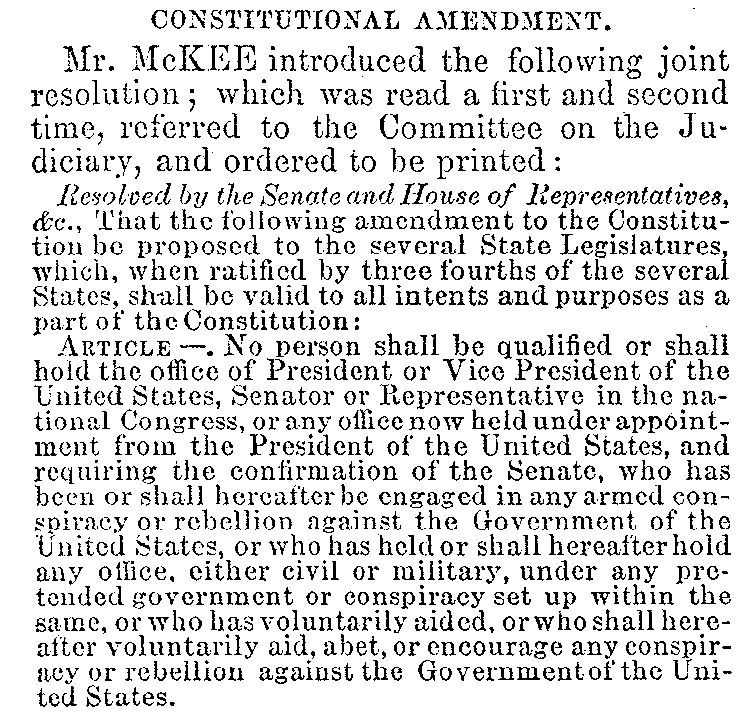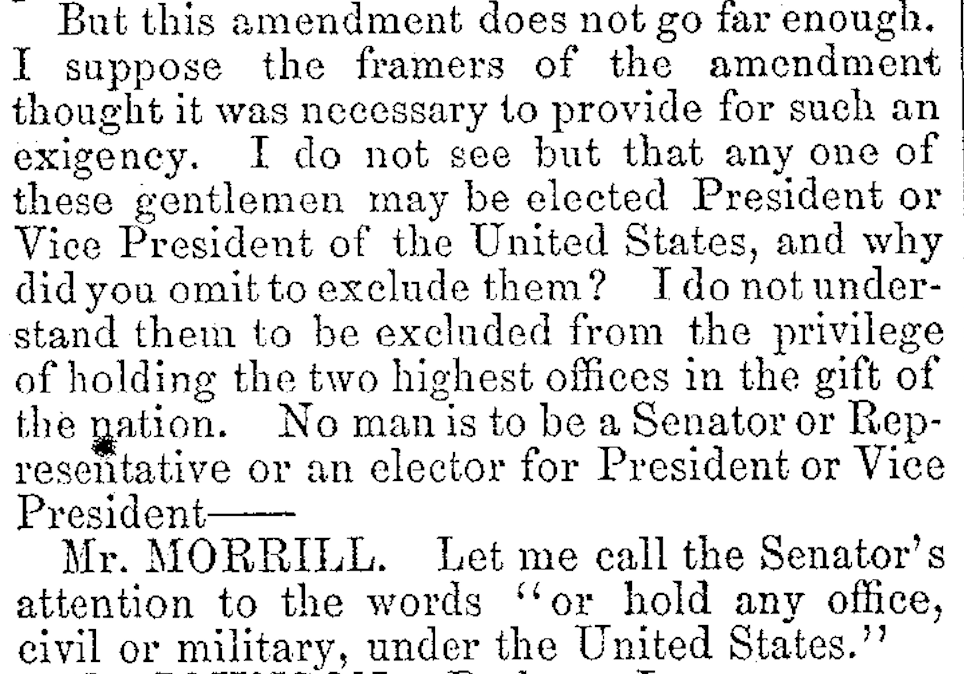Question #1:
What sources imply that the office of President was deliberately excluded from the 14th amendment?
The words President and Vice President were in the first draft of Article 14 section 3, and removed in the draft which was eventually accepted. This is in the congressional record. Also the first version of the Article was published in the newspaper and the debate was closely followed by those contemporary papers daily. Here is a research paper which covers the newspaper coverage and floor debate over the authoring of the article 14 section 3 . The debates were widely followed by the public over the entire 14th amendment and it's various revisions. There is no doubt or question that the first draft of article 14 section 3 (provided below) specifically mentions the office of the President and Vice President. As we know the final ratified version of article 14 section 3 does not specifically mention these specific offices but rather refers to any office, civil or military, under the United States.
So the debate becomes is the Presidency an office under the United States. The Constitution answers this question by referring to the Office of the Presidency 25 times. (according to the Colorado Supreme Court).
No Person except a natural born Citizen, or a Citizen of the United States, at the time of the Adoption of this Constitution, shall be eligible to the Office of President; neither shall any Person be eligible to that Office who shall not have attained to the Age of thirty five Years, and been fourteen Years a Resident within the United States.
Before he enter on the Execution of his Office, he shall take the following Oath or Affirmation: — "I do solemnly swear (or affirm) that I will faithfully execute the Office of President of the United States, and will to the best of my Ability, preserve, protect and defend the Constitution of the United States."
Amendment XII
But no person constitutionally ineligible to the office of President shall be eligible to that of Vice-President of the United States.
Amendment XXII, Section 1
No person shall be elected to the office of the President more than twice, and no person who has held the office of President, or acted as President, for more than two years of a term to which some other person was elected President shall be elected to the office of President more than once. But this Article shall not apply to any person holding the office of President when this Article was proposed by Congress, and shall not prevent any person who may be holding the office of President, or acting as President, during the term within which this Article becomes operative from holding the office of President or acting as President during the remainder of such term.
etc.
Question #2:
Where can I find the text of this early draft
On February 19, 1866, Kentucky Republican Rep. Samuel McKee proposed language for article 14, section 3 which mentions the office of President and Vice President
first draft proposed of Article 14 section 3:
No person shall be qualified or shall hold the office of President or vice president of the United States, Senator or Representative in the national congress, or any office now held under appointment from the President of the United States, and requiring the confirmation of the Senate, who has been or shall hereafter be engaged in any armed conspiracy or rebellion against the government of the United States.
Question #3
is there any recorded discussion of why it was edited?
Below is the Colorado Supreme Court's finding explanation and reasoning for interpreting the change in the first and final draft excluding the office of President and Vice President.
Colorado Supreme Court Finding page 77:
It is hard to glean from the limited available evidence what the changes
across proposals meant. But we find persuasive amici’s suggestion that Representative McKee, who drafted these proposals, most likely took for granted that his second proposal included the President. While nothing in Representative McKee’s speeches mentions why his express reference to the Presidency was removed, his public pronouncements leave no doubt that his subsequent draft proposal still sought to ensure that rebels had absolutely no access to political power. Representative McKee explained that, under the proposed amendment, “the loyal alone shall rule the country” and that traitors would be “cut[] off . . . from all political power in the nation.”
Cong. Globe, 39th Cong., 1st Sess. 2505 (1866); see also Mark Graber, Section Three of the Fourteenth Amendment: Our Questions, Their Answers, 22–23 (Univ. of Md. Legal Stud. Rsch. Paper No. 2023-16), https://papers.ssrn.com/sol3/papers.cfm?abstract_id=4591133 (“Our Questions, Their Answers”); Mark A. Graber, Punish Treason, Reward Loyalty: The Forgotten Goals of Constitutional Reform After the Civil War 106, 114 (2023)
(indicating that Representative McKee desired to exclude all oath-breaking insurrectionists from all federal offices, including the Presidency). When considered in light of these pronouncements, the shift from specifically naming the President and Vice President in addition to officers appointed and confirmed to the broadly inclusive “any officer, civil or military” cannot be read to mean that the two highest offices in the government are excluded from the mandate of Section Three.
More language from Samuel McKee author of Article 14 section 3:
- "I desire that the loyal alone shall rule the country which they alone have saved."
Related Question:
How did the Colorado Supreme Court justify extending Section 3 of 14th amendment to the presidency? How did the minority opinion argue against this?

